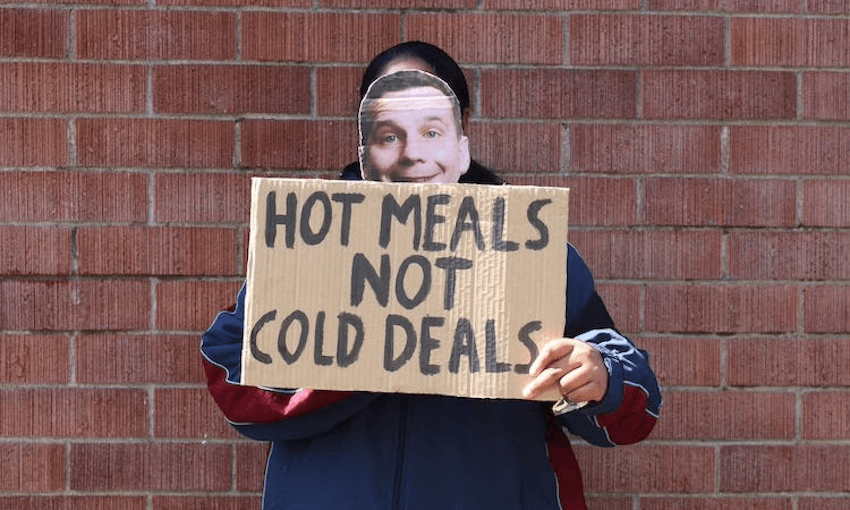A Year 11 social studies class at Waitākere College has been following David Seymour’s campaign to cut funding for free school lunches with interest, and launched a campaign of their own in response.
This is an excerpt from our food newsletter, The Boil Up.
In my past life as a high school teacher, I worked in schools with free lunches and schools without. As a beginning teacher in one of the latter – decile 4, and therefore just above the threshold for the scheme – I quickly learned to plan something low-key when I had my Year 12s after lunch. Why this class specifically? Well, because this school streamed, and we know streaming reflects socioeconomic status, so many of my low-stream seniors were from low-income families, struggling families, or had immensely complicated lives outside of school. These students were less likely to bring lunch to school, or to bring enough lunch to properly sustain their growing bodies and thinking brains. They weren’t being lazy or losing the plot during afternoon classes because they were bad or incapable. They would never admit it, but they were hungry.
Once I figured this out, I pivoted. On my meagre teacher salary, I began buying bags of bread rolls and cheese slices, packets of muesli bars and sacks of apples, all of which would disappear in minutes, save for a few apples. When I eventually moved to a school with Ka Ora, Ka Ako, I couldn’t believe the difference. Afternoon classes were still the worst, especially period five with the Year 10s right after PE, but they were nothing like what I’d experienced before. They were still teenagers, they still had their moments, but teenagers with full bellies can focus, can listen, can learn.
And there was such an abundance of kai. Instead of feeling sick with guilt whenever a student asked if I had any food when I didn’t, I could remind them they only had to hold out a little longer for lunch, or even hand them a mandarin or bag of Grain Waves from my cupboard – there were always leftover snacks which teachers were encouraged to take for their classrooms, or to offer in the tutorials or extra-curricular sessions we ran, or to eat ourselves.
I could write so much about the importance of this programme, but I think it’s more important to hear from the rangatahi on the ground. At Waitākere College, a Year 11 social studies class has been following David Seymour’s campaign to cut funding for free school lunches despite findings that the programme has had “profound impact on wellbeing”, and has taken action by starting the @wc_school.lunches campaign.
“The reason I feel passionate about this campaign is that I feel no student or person should go without food,” Hlaina Goffin (15) explains. “Free school lunches are the only food available to some students, so why should we take away or cut the budget to something that is helping the future people of the country?” Each day, the group take photos of students holding Seymour masks up and handwritten signs with slogans such as “PREVENT FOOD INSECURITY” and “#KEEPITHOT”, posting them to social media and tagging ministers. Many of the students pictured are clutching cardboard boxes containing the very kai they are seeking to protect: shepherd’s pie, butter chicken and rice, beef lasagne, fruit, muffins, cassava chips.
When asked what inspired them to start this campaign, Gabrielle Manuhuia (15) cites her teacher, Ms Thorburn, who introduced the topic of food insecurity to their social studies class and ran an inquiry into the impacts of Ka Ora, Ka Ako, as well as another student at the school who had previously contacted local MP Phil Twyford about the cuts. Maia McQuoid (15) says the funding cuts make her “feel concerned for many of the students at Waitākere College who really enjoy these meals, but not just for them, also their families. Free warm meals have really lifted a weight off many parents and caregivers’ shoulders.”
“One of the main reasons the programme exists is to reduce child poverty, food insecurity and hunger. Hunger is said to put a child back four years behind their peers in school,” Jessica Brooker (15) explains. “Not having enough energy causes them to act up and not have the focus needed. So for children to be benefited by the food they eat at school, kids need to eat something healthy rather than junky.”
But it’s not just other tamariki and rangatahi these student activists are standing up for. Jessica is also concerned about how these cuts will impact the wider school community. “I joined this campaign after hearing that the FED employees (who provide food for us) were going to lose their jobs next year, due to the shift where food will come from a central source rather than from small businesses. My inspiration is the fact that people need jobs and are struggling, yet the government is taking jobs rather than providing opportunities.”



